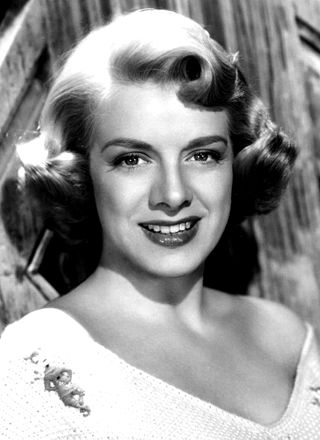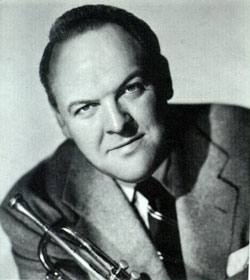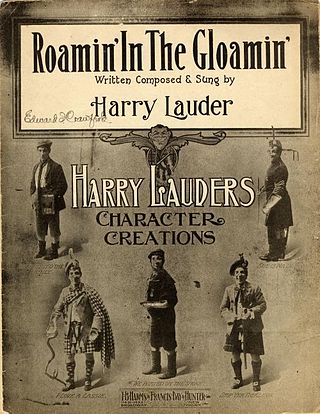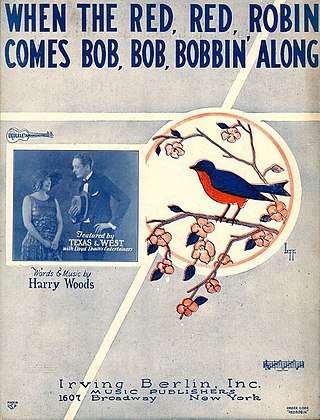
Rose M. Clooney was an American singer and actress. She came to prominence in the early 1950s with the song "Come On-a My House", which was followed by other pop numbers such as "Botch-a-Me", "Mambo Italiano", "Tenderly", "Half as Much", "Hey There", "This Ole House", and "Sway". She also had success as a jazz vocalist. Clooney's career languished in the 1960s, partly because of problems related to depression and drug addiction, but revived in 1977, when her White Christmas co-star Bing Crosby asked her to appear with him at a show marking his 50th anniversary in show business. She continued recording until her death in 2002.

"Molly Malone" is a song set in Dublin, Ireland, which has become its unofficial anthem.

Edward William May Jr. was an American composer, arranger and trumpeter. He composed film and television music for The Green Hornet (1966), The Mod Squad (1968), Batman, and Naked City (1960). He collaborated on films such as Pennies from Heaven (1981), and orchestrated Cocoon, and Cocoon: The Return, among others.
Sisters is a popular song written by Irving Berlin in 1954, best known from the 1954 film White Christmas.
"In the Cool, Cool, Cool of the Evening" is a popular song with music by Hoagy Carmichael and lyrics by Johnny Mercer. It was originally planned to feature it in a Paramount film written for Betty Hutton that never took off, which was to be called The Mack Sennett Girl. The song was buried in Paramount's files until it was rediscovered and then used in the 1951 film Here Comes the Groom and won the Academy Award for Best Original Song.
"Silver Bells" is a Christmas song composed by Jay Livingston and Ray Evans.
"I Get Ideas" is a popular song which has been recorded by various musicians and used in a number of films and television episodes.
"I've Grown Accustomed to Her Face" is a song from the 1956 musical My Fair Lady, with music by Frederick Loewe and lyrics by Alan Jay Lerner. It was originally performed by Rex Harrison as Professor Henry Higgins who also performed it in the 1964 film version.

Fancy Meeting You Here is a 1958 RCA Victor studio album of duets by the American singers Bing Crosby and Rosemary Clooney, arranged by Billy May, who also conducted the orchestra. The album was originally issued in both mono and stereo, catalog numbers LPM/LSP 1854. Fancy Meeting You Here is an early example of a concept album, the 13 songs combining romance and travel with songwriters Sammy Cahn and Jimmy Van Heusen contributing introductory and concluding versions of "Love Won't Let You Get Away" as well as a new tune called "Fancy Meeting You Here". Cahn wrote special lyrics to standards like "How About You?" and "I Can't Get Started" that reflected the late 1950s and the personalities of the two stars. Billy May conducted, and contributed his usual bouncy and lively arrangements. All of that served as a setting for the always enjoyable interaction between Crosby and Clooney.

Irving Berlin's White Christmas was an LP album of songs by Rosemary Clooney from the movie White Christmas, released by Columbia Records in 1954. The album was also released as a set of four 78-rpm records at the same time.

Selections from Irving Berlin's White Christmas is an album with songs from the 1954 movie, White Christmas. Among the featured artists are Bing Crosby, Rosemary Clooney, Danny Kaye, and Trudy Stevens, with Peggy Lee, who was not in the movie, singing some parts. It is one of the last 78 rpm albums Decca produced.

"Roamin' in the Gloamin'" is a popular song written by Harry Lauder in 1911. The song tells of a man and his sweetheart wife courting in the evening. The title comes from the chorus:
Singer Rosemary Clooney is known for many songs, including "Come On-a My House", "Botch-a-Me", "Mambo Italiano", "Tenderly", "Half as Much", "Hey There" and "This Ole House". This is a partial discography.

Rosie Sings Bing is a 1978 studio album by the American jazz singer Rosemary Clooney, recorded in tribute to Bing Crosby, who had died the previous year. The album was the second Clooney made for Concord Records.
"Younger than Springtime" is a show tune from the 1949 Rodgers and Hammerstein musical South Pacific. It has been widely recorded as a jazz standard.

"When the Red, Red Robin " is a popular song written, both words and music, by Harry Woods in 1926. The song became the signature song for singer and actress Lillian Roth, who performed it often during the height of her musical career from the late 1920s to the late 1930s.

"Peachtree Street" is a 1950 song co-written and recorded by Frank Sinatra in a duet with Rosemary Clooney. The song was released as a Columbia Records single.

After Bing Crosby's long-term Decca Records contract was up, he signed many short-term contracts with a wide variety of labels. These included many popular labels such as Reprise, RCA, Verve, Decca (again), United Artists, Capitol and more.
The Ford Show Featuring Bing Crosby was a 5-minute CBS network radio show broadcast from 1957 to 1958. It included an opening theme, one or two songs by Bing Crosby, commercials by Ken Carpenter, closing theme, and on occasion a guest such as Rosemary Clooney.

"Wiegenlied", Op. 49, No. 4, is a lied for voice and piano by Johannes Brahms which was first published in 1868. It is one of the composer's most famous pieces.












